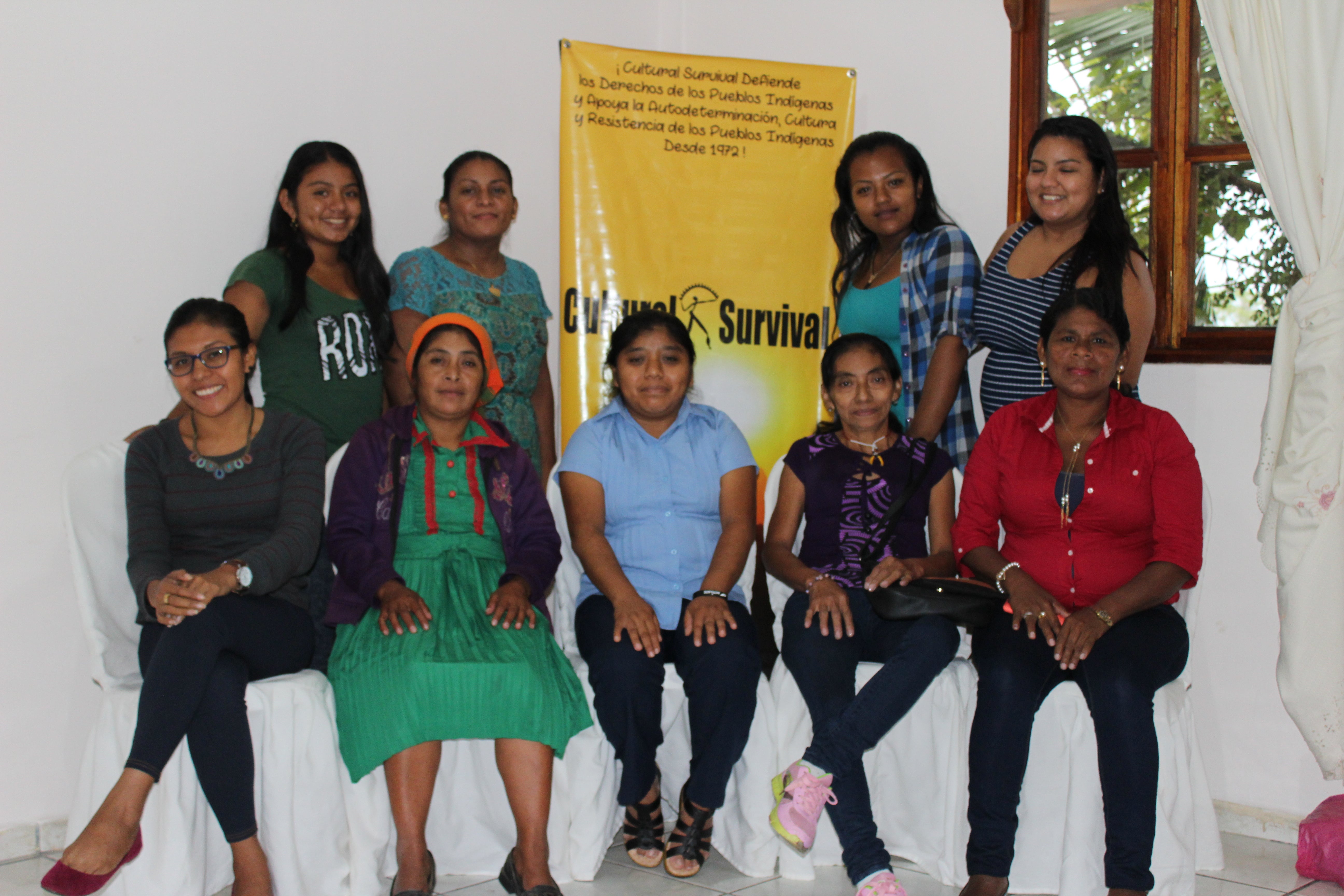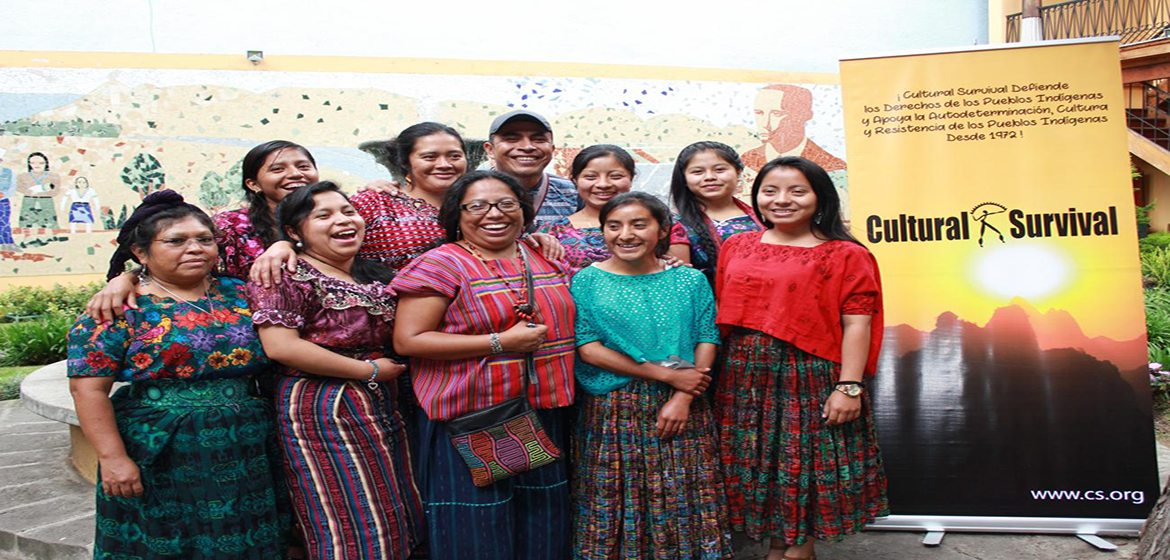"In my 12 years of doing community radio, I had never had the opportunity to produce my own radio pieces. This was a task delegated and assumed by men, and therefore I came to think it was something complicated. However, now with this workshop, I learned not only how to do radio production, but also realized that there is nothing that a woman cannot do, if approached with dedication,” said Petronila Ch’umilkaj Tax, a radio volunteer from Radio La Niña in Totonicapán, Guatemala. Indigenous women in Central America continually experience discrimination based on their ethnicity and gender. Although Central American economies vary, Indigenous women are worse off economically and socially than any other group in the general population, as they experience a deficit in access to education, healthcare, and political participation. The human development indexes of many countries confirm that the socioeconomic gap between Indigenous people and non-Indigenous people is even more prominent when comparing Indigenous to non-Indigenous women.
In the field of community radio, there is no exception. Indigenous women have almost always been relegated to the lowest level tasks and excluded from decision making, with the largest gender disparity remaining at the decision making levels. This means that women’s voices are not taken into account regarding programmatic content, economic sustainability, or strategic planning. As a result, most Indigenous community radio stations lack content promoting gender equality, addressing issues that are of interest to women, or educating on women’s rights. Over the years, Indigenous women community broadcasters from across Central America have expressed their concern for, and interest in, the advancement of Indigenous women’s rights, while recognizing the limitations of their own cultures where women are often discouraged from participating. After years of women’s activism, increasingly radio stations are acknowledging of the importance of female participation.
Cultural Survival believes in promoting Indigenous women’s voices and leadership, especially in media. In 2017, 167 Indigenous women from Central America and Nepal took part in trainings in radio production and radio journalism organized by Cultural Survival. Last fall, with the support of the Channel Foundation, wrapped up a training project aimed at strengthening the participation of Indigenous women in community radio in Central America. Two sessions were held in September, one with ten Guatemalan women in Quetzaltenango, Guatemala, and the second in Managua, Nicaragua with ten women from El Salvador, Honduras, Nicaragua, Costa Rica, and Panama. The goal was to increase the knowledge of women in journalism and radio production and plan a path from empowerment to leadership. As a result of the trainings, several women produced their own radio programs for the first time.
The two trainings offered playful exercises aimed at re-evaluation of concepts surrounding female bodies and capacities as women and human beings, fundamental to raising women’s self-esteem and strengthening leadership skills of each of the participants. They also gave the women space and time to reflect on their roles and daily lives, especially in their roles as Indigenous women journalists, where they have the opportunity to be voices for social change in the fight against gender discrimination, racism, and human rights violations. In order to bring the participants together, staff had to consider the long distances many had to travel, which posed difficulty for some of the women to leave their remote communities with little access to public transport, along with the scrutiny from their relatives for so-called abandonment of their chores as women. In order for Vilma Washington of Radio Wangki Tangi, the voice of the women in Waspam, Nicaragua, to leave her community, she had to travel 20 hours in poor conditions to arrive in Managua. Despite facing similar challenges, many women said that they felt liberated by the simple act of leaving their communities and were thus enabled to overcome their fears.
In Quetzaltenango, Guatemala, from September 6–8, 10 community journalists from Totonicapán, Sololá, Quiché, Sacatepéquez, Alta Verapaz, and Huehuetenango gathered in September to learn, share, and practice their professional skills. Facilitator Alfredo Rax Coc, who was sensitized to the gender approach, was warmly received by the women. “It is good for us to have the support of Rax and to know that there are men who respect our rights and are willing to support us,” said Erika Oxon of Radio Nimlajacoc. The night before commencing a workshop on community feminism, led by Lorena Cabnal (Xinka), community feminist and co-founder of the Association of Indigenous Women of Santa María Xalapán, a major earthquake shook Mexico. In Quetzaltenango, it was felt with an intensity of 7.8. The earthquake caused much fear and resulted in evacuations from the hotel into the streets in the middle of the night. However, the women found their desire to talk about their realities as Indigenous women was stronger than their fear. “It was interesting to listen to Lorena and learn from her,” commented Rigoberta Gonzáles from Radio Ixchel. “Often people and society create divisions between women, which mark our relationships. We leaxfrned to respect plurality and how not to be part of the patriarchal system that weakens through division. We often undertake struggles for material goods and forget the many assets we possess—our bodies and our knowledge.” Gonzáles also stressed that this training allowed her to renew her strength to continue her struggle as a community journalist. To wit, Cabnal added, “The journalists are the ancestral tabaleras, the community spokespeople. They fight a daily struggle with manifestations of the machismo and the criminalization of their work. Community feminism contributes from its own view, promoting equity and living well for women and peoples.”
The second training, which took place from September 17-21, 2017, in Managua, Nicaragua brought together ten women community journalists from El Salvador, Honduras, Nicaragua, Costa Rica, and Panama to learn how to use an open source editing program, Audacity, and produce and edit their own radio pieces. “Fear can paralyze us; knowledge can frighten fears,” said Francisca Díaz (Lenca) from Honduras, who, at 52 years old, had never touched a computer. Although she has more than five years’ experience as a community journalist in Radio Taragual in La Pedernal La Iguala, she had never been given a chance to produce her own programs until now. Díaz spoke of her dream to be a doctor, but said she did not have the opportunity to go to school. It was due to her need to communicate with the radio audience that propelled her to learn to read and write. Today, Díaz is an inspiration for young women, now serving as a doctor of traditional medicine through her community radio program, “The Medicine Truck.”

In Nicaragua — L–R: Lauris Hernandez, Sarita Mendoza, Maria Santos Lopez, Esmeralda Leiva, Bessi Ramirez, Maria Fracisca Diaz, Keilen Blanco, Teresita Orozco, Vilma Washington.
Although the participation of women in most community radio stations is still not widely deemed as a priority, there have been some positive changes. Both the directors of local community radio stations and other organizations that partner with Cultural Survival in the Central American Indigenous Radio Network have begun to consider women’s participation as something positive and as an asset. As a result of the trainings, there are 20 radio programs available on women’s issues produced by the participants, addressing issues of importance to women and Indigenous Peoples according to the context of each community and respecting the cultural practices of each region and country. These programs will be aired at the women’s home radio stations, enhancing the programming of each station. In addition, the women who participated in the workshops are equipped with a greater sense of hope, knowledge, and empowerment that will drive them forward in their work. As many participants pointed out, being able to name to certain social injustices is an empowering first step to identifying and working toward their solutions.
Source:



